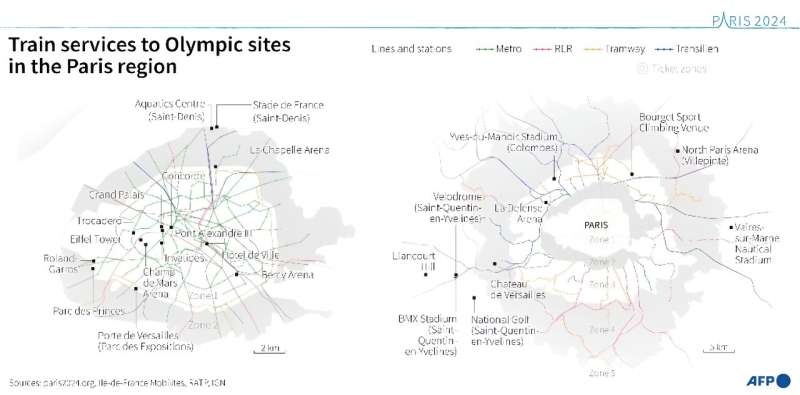
The head of France's national cybersecurity agency said the Paris Olympics would be a "target" this year including for foreign states interested in "disrupting the opening ceremony or causing problems on public transport".
The warning from Vincent Strubel, director general of the French Cybersecurity Agency (ANSSI), comes amid strained diplomatic relations between France and Russia over the war in Ukraine.
Comments from French President Emmanuel Macron last month suggesting Western troops could be sent to Ukraine has unleashed fury in Moscow, which the French authorities have been blamed for past disinformation and hacking campaigns.
"Clearly the Olympic Games are going to be a target," Strubel told AFP in an interview Tuesday. "We are getting ready for all types of attacks—everything we see on a daily basis but in bigger, more numerous and more frequent," he added.
These included "attacks from states that want to disrupt the Games because they are not happy for one reason or another, and who might try to disrupt the opening ceremony or cause problems on public transport", he said on the sidelines of a cybersecurity event in Lille, northern France.
Russia has also accused the International Olympic Committee of "racism and neo-Nazism" after Russian athletes were barred from the opening ceremony of the Paris Games which will begin on July 26.
Russian athletes have been largely excluded from the sport, with only a handful of competitors expected to qualify as "neutrals".
Strubel said state-backed cyber attacks were one of the three main dangers, the others being cyber-criminals trying to extort money during the Olympics as well as "hacktivist" hackers looking to cause trouble for fun or publicity.
"For me, the worst-case scenario is that we find ourselves flooded with small-scale attacks and that we don't anticipate a more serious attack targeting critical transport or energy infrastructure playing a vital role during the Games," he told AFP.

Past Olympics
Created in 2009, ANSSI is France's main state cybersecurity agency, tasked with preventing, detecting and responding to attacks.
Japanese telecom company NTT, which provided IT security for the pandemic-delayed Tokyo Olympics held in 2021, reported 450 million individual cyber attacks during the last edition of the Games, twice as many as during the 2012 London Olympics.
Many of those were so-called DDoS attacks, which paralyze the servers hosting a website, as well as attempted hackings, email spoofs, phishing attacks or fake websites.
Russian military intelligence services were blamed by the US for releasing the so-called "Olympic Destroyer" malware shortly before the opening ceremony of the 2018 Pyeongchang Winter Olympics in South Korea, from which Russian athletes were banned.
The malware deleted data from thousands of computers supporting the Pyeongchang Games, rendering them inoperable.
Other experts have suggested that the electronic ticketing system for the Paris Games, or IT networks for sports venues or the results system could be targets.
A serious financial crisis has engulfed France's leading IT services and cyber-security company Atos just as it prepares to play a crucial role during the Games.
The debt-ridden group, whose shares have lost around 90 percent of their value since last July, has been the main technology partner for the International Olympic Committee since 2002 and is a critical cybersecurity provider for the Paris Games.
"Obviously we are particularly vigilant, which can be seen in our audits of Atos' systems that will be used for the Games and for other critical systems," Strubel said. "And in the very regular meetings we have with Atos teams to ensure that there are not any problems.
"But we don't see any at the moment, so no worries," he added.
© 2024 AFP
Citation: French cyberdefence chief warns Paris Olympics a 'target' (2024, March 27) retrieved 27 March 2024 from https://techxplore.com/news/2024-03-french-cyberdefence-chief-paris-olympics.html
This document is subject to copyright. Apart from any fair dealing for the purpose of private study or research, no part may be reproduced without the written permission. The content is provided for information purposes only.
